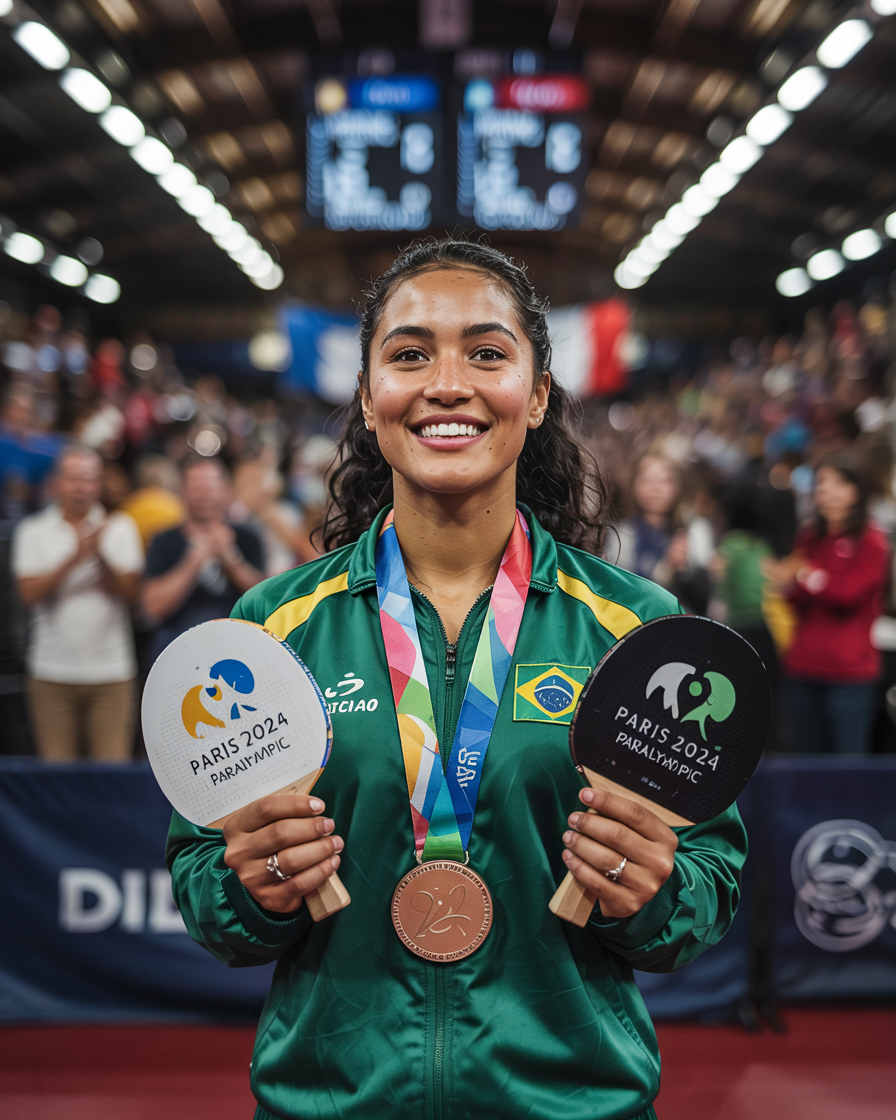Brazilian table tennis player Bruna Alexandre etched her name into the history books in 2024 by becoming the first Brazilian athlete ever to compete in both the Olympic and Paralympic Games — a feat that symbolizes not only sporting excellence but also the breaking of barriers in inclusion and representation.
Her double participation in Paris 2024 captured national and international attention, as she challenged traditional notions of separation between Olympic and Paralympic athletes and brought global visibility to adaptive sport.
A Groundbreaking Achievement
Bruna, born without her right forearm due to a congenital condition, has long been a standout in the Paralympic arena. She is a multiple medalist in international competitions, including the Paralympic Games in Rio 2016 and Tokyo 2020. But in 2024, she took her career to a new level by qualifying for the Olympic table tennis team, competing alongside able-bodied athletes.
Her presence at both events was more than symbolic — it was competitive. In the Olympics, she advanced to the second round, defeating a higher-ranked opponent from Europe. Just weeks later, in the Paralympics, she returned to her usual podium-hunting form, securing a bronze medal in the women’s singles Class 10 category.
Speaking to the media after her final match, Bruna said:
“I wanted to prove that we belong everywhere — in both arenas. Sport is about ability, dedication, and heart. And I’m proud to carry the flag for everyone who’s told they can’t.”
The Path to Paris: Years in the Making
Bruna’s journey to the Olympics was the result of intense preparation and a visionary strategy. In 2021, she and her coaching team set a goal to qualify for both Games — a challenge that required:
- Meeting the ITTF world ranking criteria for able-bodied athletes.
- Competing in both Olympic and Paralympic qualifying circuits.
- Balancing two separate training regimens, including matches against high-speed Olympic opponents.
Her qualification became official in early 2024, when she secured the final continental spot in the Pan-American Olympic Qualifier — making headlines across Brazil and becoming an ambassador for inclusive sport.
Impact on Sport and Society
Bruna Alexandre’s dual representation has sparked important conversations in the sports world. Her achievement has:
- Inspired national federations to consider more integration in training facilities and events.
- Challenged the narrative that divides Paralympic athletes from mainstream sports excellence.
- Elevated visibility for Paralympic athletes in Brazilian media, including coverage on prime-time news and major sports shows.
Her story has already been included in Brazil’s new national school curriculum for physical education, and a documentary chronicling her journey is in production, set to premiere on Globoplay in early 2025.
Recognition and Awards
After the Games, Bruna received widespread recognition, including:
- The Order of Sports Merit, awarded by the Ministry of Sports.
- A tribute at the São Paulo State Assembly, celebrating her as a role model for women, people with disabilities, and young athletes.
- Invitations to speak at universities, conferences, and TEDx events across Brazil.
Bruna continues to advocate for equal investment in Paralympic sport, accessible infrastructure, and visibility for disabled athletes beyond Paralympic cycles.
Conclusion: A New Chapter for Brazilian Sport
Bruna Alexandre didn’t just compete — she transformed perceptions, opened new doors, and showed an entire generation what’s possible when limits are challenged with courage and commitment.
Her double appearance in Paris 2024 is more than a medal-winning moment — it’s a movement. And her legacy will continue to inspire those who believe sport should be a place where everyone has a seat at the table — and a paddle in hand.
